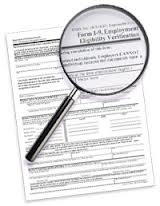The California Immigrant Worker Protection Act also known as IWPA became effective on January 1, 2018.

- They are prohibited from giving federal immigration agents access to non-public areas of the workplace or employee records without a judicial warrant or subpoena;
- They are required to give employees and union representatives (if any) notification before and after I-9 inspections; and
- They cannot reverify the immigration eligibility of employees to continue working unless mandated by federal law.
On July 5, 2018, Federal Judge John Mendez granted the Trump administration a preliminary injunction on provisions of IWPA that limit an employer’s ability allow Federal immigrant agents to enter non-public areas of the workplace without a judicial warrant and to reverify an employee’s eligibility to work in the US. In USA v. State of California, the Judge dismissed claims that other sections of IWPA conflict with Federal immigration laws. However, the Judge left open the possibility that the court could change its ruling on this point when more evidence is presented “at a later stage of this litigation.”
On April 19, 2019, the U.S. Court of Appeals for the 9th Circuit largely sided with the decision of Judge Mendez.
Client Reviews

Great Work!
“We are very pleased by the services we get from the Law Offices of Carl Shusterman. Our experience in the past year with all our H1B renewals has been amazing, and we’ve obtained great results.”
- KRG Technologies, Valencia, California
Read More Reviews
Zoom Consultations Available!
Access to Non-Public Areas of the Workplace or to Employee Records
In order for a federal immigration agent to be able to access non-public areas of the employer’s workplace, the agent must present an warrant issued by a judge. An administrative warrant signed by an Department of Homeland Security (DHS) officer does not suffice. The IWPA law provides that an employer can not voluntarily permit a federal immigration agent to enter these areas without a warrant.
IWPA also prohibits employers from sharing employee records with a federal immigration agent unless they first present a subpoena or a judicial warrant.
However, the requirement that the agent present a subpoena or a judicial warrant is waived where the agent serves the employer with a Notice of Inspection (NOI) to review the employer’s I-9 forms and attached documents.
Required Notifications Before and After I-9 Inspections
Upon receiving a Notice of Inspection, an employer is required by IWPA to post a notice informing it’s employees (and their union representative, if any) of the NOI within 72 hours. The notice must be in the language or languages normally used to communicate employment-related matters. The posting notice must contain the following information:
- The name of the federal immigration agency conducting the inspection;
- The date that the NOI was received by the employer;
- The nature of the inspection to the extent known; and
- A copy of the NOI.
Within 72 hours after receiving the results of the I-9 inspection, the employer must provide each “affected employee” (and their union representative, if any) with a copy of the written results and the obligations of the employer and the employee arising from the results of the inspection. An affected employee is one who lacks proper work authorization documents or whose documents have been found by the federal immigration agency to be deficient. This notice must be hand-delivered, or if this is not possible, delivered by mail.
This notice must contain the follow information:
- A description of any and all deficiencies or other items identified in the written immigration inspection results notice related to the affected employee;
- The time period for correcting any potential deficiencies identified by the immigration agency;
- The time and date of any meeting with the employer to correct any identified deficiencies; and
- Notice that the employee has the right to representation during any meeting scheduled with the employer.
Penalties for IWPA Violations
IWPA violations can result in civil fines of up to $10,000.
A violation of the reverification provision can lead to a penalty of up to $10,000.
Failure to satisfy any of the other provisions can result in penalties ranging from $2,000 up to $5,000 for a 1st violation, and from $5,000 to $10,000 for any subsequent violations.
IWPA Advice for Employers
IWPA can prevent some California employers from becoming compliant with federal immigration laws.
Employers need to properly train their human resource staffs what to do in case of a visit by federal immigration agents. If an HR employee is unable to distinguish between an ICE agent and a person working for the FDNS or between an administrative and a judicial warrant, this could have disastrous consequences.
In addition, HR staff should be trained in how and when to post notices when a Notice of Inspection is received and how to notify affected employees (and union representatives, if any) of the results of a federal I-9 audit. They should also be aware of when I-9 forms can be reverified and when it is a violation of IWPA to do so.
Related Pages – IWPA
- California’s Immigrant Worker Protection Act
- Notice to Employee Template under IWPA (California Department of Industrial Relations)
- 9th Circuit Court of Appeals (Mostly) Upholds Decision of U.S. District Court in USA v. California (4-18-19)
- Guidance and Model Policies to Assist the Division of Labor Standards Enforcement, the Agricultural Labor Relations Board, and the Division of Workers Compensation in Responding to Immigration Enforcement (October 2018)
- Attorney General Becerra Secures Dismissal of the Federal Government’s Claims Against California in USA v. California (7-09-18)
- California Attorney General Issues Advisory Providing Guidance on the Privacy Requirements of the IWPA (2-13-18)
- California Attorney General’s Advisory on IWPA (2-13-18)
- IWPA – Frequently Asked Questions (2-13-18)
- Videos: Employers – How to Survive an I-9 Audit
- I-9 Compliance for Employers
- Can Your Company Survive an I-9 Audit?
- I-9 Central (USCIS)
Decades of Immigration Experience Working for You
What Can We Help You With - Videos
Carl Shusterman
Immigration Attorney Carl Shusterman has 40+ years of experience. He served as an attorney for the U.S. Immigration and Naturalization Service (INS) from 1976 until 1982, when he entered private practice. He has testified as an expert witness before the US Senate Immigration Subcommittee. Carl was featured in SuperLawyers Magazine. Today, he serves as Of Counsel to JR Immigration Law Firm.







